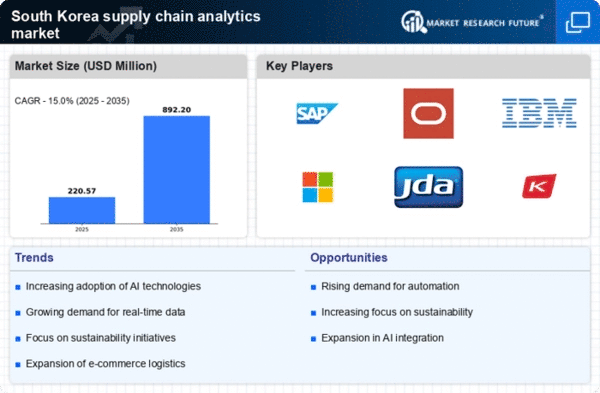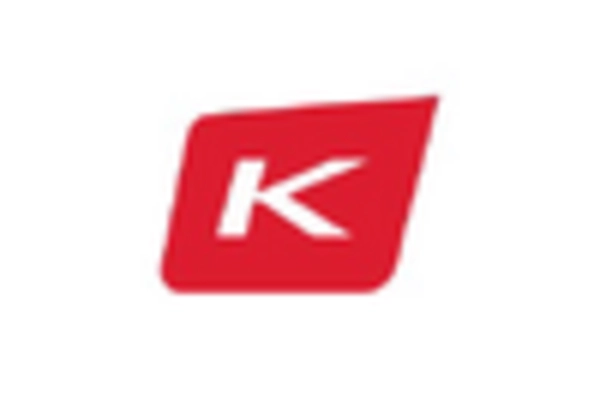Increased Focus on Risk Management
The supply chain-analytics market in South Korea is increasingly influenced by the heightened focus on risk management. As global supply chains become more complex, organizations are recognizing the importance of identifying and mitigating risks associated with supply chain disruptions. Analytics tools provide valuable insights into potential vulnerabilities, enabling companies to develop robust contingency plans. This proactive approach to risk management is essential in maintaining business continuity and resilience. Furthermore, the South Korean government has been advocating for improved risk management practices, which is likely to bolster the adoption of analytics solutions in the supply chain-analytics market.
Growth of E-commerce and Online Retail
The rapid growth of e-commerce and online retail in South Korea is a significant driver of the supply chain-analytics market. As consumer preferences shift towards online shopping, businesses are compelled to adapt their supply chain strategies to meet the demands of this evolving landscape. Analytics plays a crucial role in optimizing logistics, inventory management, and customer service in the e-commerce sector. Data suggests that e-commerce sales in South Korea are projected to reach approximately $100 billion by 2025, necessitating advanced analytics solutions to manage the associated supply chain complexities. This trend is likely to propel the growth of the supply chain-analytics market as companies seek to enhance their operational capabilities.
Rising Demand for Operational Efficiency
In South Korea, the supply chain-analytics market is significantly driven by the rising demand for operational efficiency among businesses. Companies are under constant pressure to optimize their supply chain processes to reduce costs and improve service levels. By leveraging analytics, organizations can identify bottlenecks, streamline operations, and enhance inventory management. Reports indicate that businesses utilizing analytics can achieve cost reductions of approximately 15% in their supply chain operations. This focus on efficiency is further amplified by the competitive landscape in South Korea, where firms are striving to maintain a competitive edge through enhanced operational performance.
Technological Advancements in Analytics Tools
The supply chain-analytics market in South Korea is experiencing a surge due to rapid technological advancements in analytics tools. These innovations enable businesses to process vast amounts of data efficiently, leading to improved decision-making capabilities. For instance, the integration of advanced algorithms and machine learning techniques allows for predictive analytics, which can enhance demand forecasting accuracy by up to 30%. As companies increasingly recognize the value of data-driven insights, the demand for sophisticated analytics tools is likely to grow. This trend is further supported by the South Korean government's initiatives to promote digital transformation across industries, thereby fostering a conducive environment for the supply chain-analytics market.
Government Initiatives Supporting Digital Transformation
In South Korea, government initiatives aimed at supporting digital transformation are significantly impacting the supply chain-analytics market. The government has launched various programs to encourage the adoption of advanced technologies, including analytics, across industries. These initiatives not only provide financial incentives but also foster collaboration between public and private sectors to drive innovation. As a result, businesses are increasingly investing in analytics solutions to enhance their supply chain operations. The government's commitment to digital transformation is expected to create a favorable environment for the growth of the supply chain-analytics market, as companies seek to leverage data for competitive advantage.
















